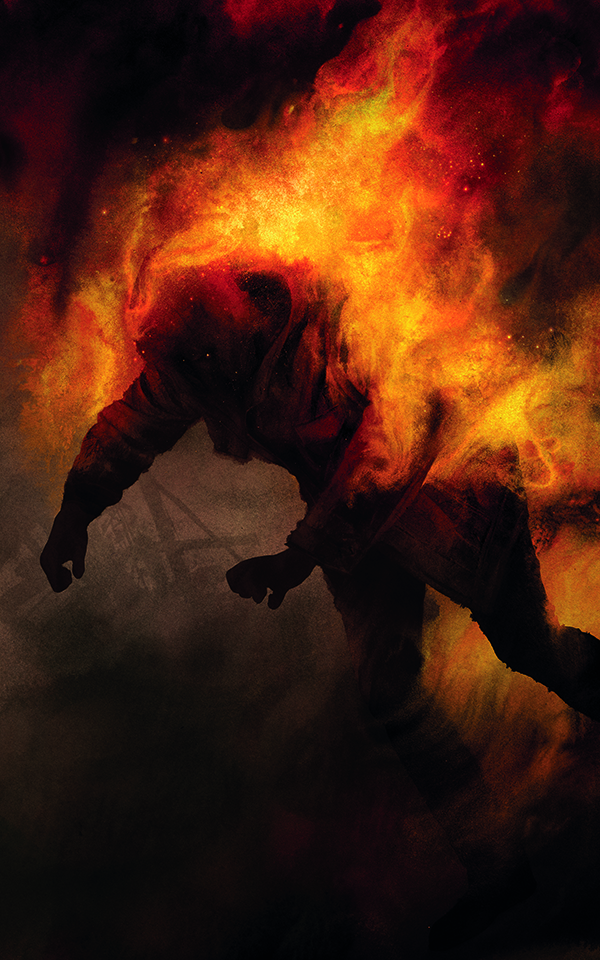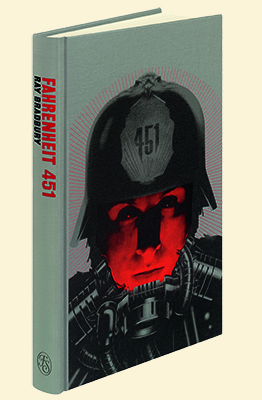In the late 1960s my friend J. G. Ballard phoned me full of outrage. Feeling weighed down by the bad prose cluttering his study, he had dug a pit in his back garden and thrown his review copies in, splashing them with a little petrol. But they proved harder to burn than he thought, so he put one in the kitchen oven, which had a suitable thermometer, to test the igniting heat of book paper. “Bradbury was wrong!” he complained. “Fahrenheit 451 isn’t the temperature at which book paper burns!” But, I asked, hadn’t Bradbury phoned the Los Angeles Fire Department to get the temperature right?
“Well, they’re wrong, too!” announced Ballard, who admired Bradbury and whose own early Vermilion Sands stories echo Bradbury’s The Martian Chronicles. Ray Bradbury, he said, had shown him that science fiction was worth writing.
Ironically, Bradbury, like Ballard, was primarily a fantast. He wrote very little science fiction, even as he became a measure of how good the genre could be. He said so in a 1999 interview with the Weekly Wire: “I don’t write science fiction. I’ve only done one science fiction book and that’s Fahrenheit 451.”
 Illustration by Sam Weber.
Illustration by Sam Weber.
Ballard had come across Bradbury in Galaxy magazine where “The Fireman,” the original version of this book, appeared. By then Bradbury was beginning his mature career. As a boy, unable to find more books by my favorite fantast Edgar Rice Burroughs, I discovered Bradbury’s early fiction in second-hand copies of Planet Stories and Weird Tales, whosenstories were full of Gothic riffs and echoes of Edgar Allan Poe.
Similarly, while he was growing up, Bradbury’s earliest literary hero was also Burroughs. Famous for his Tarzan tales, Burroughs began his career with an exotic interplanetary romance, A Princess of Mars, which depicted an ancient and dying planet of red deserts and eroded mountains. These were not unlike the landscapes of Arizona and California he experienced serving in the US cavalry, when the army still chased the Apaches on whom Burroughs would model his humanoid Martians. When he moved from Illinois to settle in California, he called his ranch Tarzana, selling off land as his books went out of fashion, until the name became attached to a dormitory suburb of Los Angeles. Meanwhile, Burroughs’s evocative Martian landscapes were a powerful influence on a native Californian, Leigh Brackett.
Better known today for screenplays like The Big Sleep and The Long Goodbye, Brackett first came to fame with her moody science-fantasy stories, many describing an ancient Mars, with its dreaming deserts and dead cities full of whispering ghosts and half-real myths. In turn, her stories were another enormous influence on Bradbury’s early fiction. A writer in many genres, Brackett was introduced to the enthusiastic youngster at an SF society meeting. She was impressed by his evident talent and became a mentor, inviting him to finish her novella Lorelei of the Red Mist when a movie-writing commission came her way. At her marriage to fellow author Edmond Hamilton, Bradbury was best man.
The Martian Chronicles is a more sophisticated interpretation of the influences Bradbury shared with Brackett. Burroughs, Brackett and Bradbury were Californians just like the noir trio of Hammett, Chandler and Caine. All drew their language and images from the wide range offered by that state. The crime writers were attracted to the busy, brash, growing cities, and the slang and strange characters to be found there. Very likely the abandoned Navajo and Apache desert strongholds inspired those lost Martian cities, just as Death Valley became the ‘ochre deserts of ancient Mars’ haunted by dying races. Ghost towns and the remains of settlements, both Anglo and Amerindian, can still be found in the region. They carry a wealth of romantic associations similar to those which inspired the Gothic writers in wild nineteenth-century Europe, offering the young Bradbury experience and imagery as authentic as that which first excited the English Lake poets or the French Romantics.
It was, however, the ever-expanding suburbs of Los Angeles which had an important impact on the maturing Bradbury’s imagination. As America emerged from Depression and war, LA was among the first cities to experience on any scale those early forms of consumerism which helped inspire the world of Fahrenheit 451.
Born in Illinois in 1920, Bradbury lived there until his family moved first to Arizona, then to Los Angeles. He grew up during the Great Depression when money was scarce and simple pleasures were the norm. Like so many others he escaped into a world of fantasy, in movies, comics and primarily books borrowed from the public library. Published first in fanzines, he developed his lyrical, yearning style early on. In LA he experienced the post-war spread of suburban America, the disappearance of small-town life, the loss of that comforting isolation when books offered knowledge and escape. This had a strong influence on his fiction, especially Fahrenheit 451, bringing him to readers who recognized themselves and their society in his work and would make him one of the most popular authors in the post-industrial world.
 Illustration by Sam Weber.
Illustration by Sam Weber.
For all his nostalgia, Bradbury was perfectly positioned to experience what to most of us was still the future. In the 1940s and 50s Southern California boomed. People from all over the USA were attracted there by jobs in agriculture, engineering and the non-print media. Hollywood dream factories expanded to include television. Fantasy and reality found a perfect blend. Bradbury’s visual imagination, his lyrical style and experience of a changing world were ideally suited to suggest what the future might hold for us.
In contrast to most of those in the West, East Coast American SF writers and editors of the 1940s and 50s were of a radical, left-wing disposition, making them one of the few groups able, like SF writers under Stalin, to describe and examine their society without attracting the attention of the censors. Movie-makers, magazines, media of all kinds grew circumspect, afraid to challenge the hysteria in case they should find themselves in turn destroyed by the McCarthy twister. Searching for some critique of that society, many US and European intellectuals found the only pointed criticism of America in the SF magazines, especially Galaxy, edited by H. L. Gold. An agoraphobic with no interest in space-exploration or the “hard” sciences, Gold consciously determined to raise the literary standards of SF and create a magazine people would be proud to be seen reading. He was interested in sociology and psychology and had a good nose for the subtler changes taking place in American life.
Although something of a reformed radical, Gold still had a taste for fiction that addressed contemporary issues and challenged, for instance, the authority of Joe McCarthy and his witch-hunting cronies. He loved satirical stories and fiction that took an ironic look at American society. He got his Italian publisher to give him the best production values and budget, and offered authors the highest fees. From the beginning, in 1950, the magazine published superior stories by ambitious writers encouraged by Gold’s policies; and had a circulation close to 100,000 copies an issue. Ray Bradbury, on the cusp of a career begun in the pulps and to find its largest readership in “slicks” like Cosmopolitan and Playboy, was among the writers attracted by the rewards and opportunities offered by Gold. Our imagined world of the future, the one we’re now living in, owes at least as much to Gold as it does to Philip K. Dick. And Gold’s future was to a degree inspired by Ray Bradbury’s.
Bradbury already had an outstanding reputation among SF and fantasy fans as a stylist and a fantast. His name on a cover invariably helped sales. When he sent in a novella designed to appeal to Gold and earn his high rates, Gold was delighted. In its fifth issue, for February 1951, Galaxy ran “The Fireman.” It convinced those readers who considered Bradbury’s fiction all style and little substance that, while he left much understated, he definitely had a good deal to say. Another memorable story soon followed, one which also struck a familiar chord. I am not the only person, walking in Beverly Hills in recent years, to be stopped by a suspicious police car wanting to know why I was on foot. “The Pedestrian” appeared in the Reporter, August 1951, and was, Bradbury told an interviewer, the opening of “The Fireman.”
“The Fireman” was immediately popular, soon becoming Fahrenheit 451. Expanded and rewritten, it was published in 1953 by Ian and Betty Ballantine, who had a taste for ambitious imaginative fiction, with a distinctive origami-inspired cover by Joseph Mugnaini of the weeping Fireman, Montag. Together with The Time Machine, Brave New World and 1984, Bradbury’s novel became an enduring classic, constantly in print. In 1966 the book was filmed by the great François Truffaut.
“The novel, in spite of its prophetic accuracy, survives precisely because it is not intended as literal prediction. It is not written on one level but on several.”It has to be said, the film was an artistic and commercial failure. Considering his closeness to the Hollywood studios and his highly visual fiction, Bradbury has been poorly served by film but Truffaut’s movie failed to do credit to Bradbury’s book in almost every way. Unexpectedly, the film neither rose to Bradbury’s level of imagination nor reflected his instincts for the fault lines he sensed in modern society.
Truffaut sentimentalized the book. He failed to recognize its strengths. Something similar occurred in the 1990s when Mel Gibson bought the film rights. The project was shelved for a reason that showed how poorly Gibson understood it. They’d had trouble finding a script, Gibson explained. Computers had made the central idea, of burning books, a bit outmoded. That’s like saying that The Pilgrim’s Progress won’t interest readers because almost nobody wears big white collars and big black hats any more.
Of course, the novel, in spite of its prophetic accuracy, survives precisely because it is not intended as literal prediction. It is not written on one level but on several.
Bradbury has described Fahrenheit 451 as a myth or a metaphor and denied any political intention in his picture of a near-future society where books are not only banned but where it has become illegal to read. Bradbury is very clear that it took no special revolutionary tyranny to achieve this. His point is that we arrived in the novel’s world via the popular vote, by public will. He shows us how democracy itself can be manipulated so that we become consenting elements in a system designed to make the rich richer, the poor poorer and the middle class, the anxious consumer class, constantly on the brink of losing its credit.
 Illustration by Sam Weber.
Illustration by Sam Weber.
Bradbury might be the first author to offer “market forces” as the base of a dystopia. In that sense he could be said to share ties with those East Coast writers who provided Galaxy with some of its best work. Marxist critics would have no difficulty in analyzing the book as a description of a certain kind of doctrinaire capitalism, where the middle class is reduced to nothing more than so many consumer units, where entertainment has become a never-ending reality show and literacy is not only marginalized but actively discouraged. On rereading this wonderfully spare moral tale others have also been struck by its parallels in present-day society.
Although Bradbury obviously held up a mirror to the world so that it might see itself the better, I believe him when he claims that he was not setting out to do what Orwell did in 1984, nor even what Pohl and Kornbluth did in a later Galaxy serial “The Space Merchants.” Rather, like Philip K. Dick, he let his excellent instincts have their way. They told him what to put in while his taste told him what to leave out. He was doing what he had always done by letting the resonances in his own imagination determine the kind of story he told: Fahrenheit 451 remains as readable as when it was written, some sixty-odd years ago, thanks to Bradbury’s almost psychic sense of how the world works.
Happily, Bradbury had the sense to trust his imagination and not fall into the trap which swallowed H. G. Wells and others, believing that the public valued him for his oracular logic rather than his imagery and evocative story-telling, his romantic sensibility. However, he was delighted when his vision of the future proved accurate. Writing only a few years after the book was published he proudly remembered predict- ing almost exactly the kind of radio people were now plugging into their ears.
In a scene written for the 2002 play adaptation Bradbury’s instincts are as responsive as ever. He borrows one or two of Truffaut’s structuring methods, which help improve the balance of the story though also sentimentalizing it a little, but adds further substance by having Captain Beatty show Montag a secret room in his house which has become in essence a great library. As the two men enter Beatty’s house all its devices—clocks, stoves, television and so on—respond to Beatty’s question of “Everyone home?” by murmuring “Yessss . . . here . . . home . . . hello . . . hello . . . ” and Beatty explains how he’s programmed them: “My family, Montag. Assorted voices, assorted needs.” He then shows Montag his huge cases of books. Montag recoils in shock.
BEATTY: Mine, yes, mine!
MONTAG: But you, you, YOU!
BEATTY: Yes, me, me, me! The Captain, the Fire Chief! Makes you afraid, does it? Never seen so many books, eh?
When Montag asks if anyone else knows of the collection Beatty tells him he’s the only one. The captain has been collecting them for 30 years. Stunned, Montag blurts: “But it’s against the law!” Beatty responds:
Only if you read them. Don’t you see the beauty, Montag? I never read them. Not one book, not one chapter, not one page, not one paragraph! I do play with ironies, don’t I? To have thousands of books and never crack one, to turn your back on the lot and say: No . . . These books die there on the shelves. Why? Because I say so. I do not give them sustenance, no hope with hand or eye or tongue. They are no better than dust.
Bradbury’s additional scene asks: Why bother to ban books when people voluntarily ignore them? Books don’t have to be hunted to extinction. Books die as a result of our taking them for granted. As the world of books steadily shrinks publisher by publisher, shop by shop, library by library and reader by reader, the result is the same. Only here and there, powerless to resist the general momentum of society, do a few people remain who love literature enough to try somehow to preserve it. So perhaps Bradbury suggests, at the end of this dark fable, all is not lost. Not quite.
Paris, June 2011
![]()

From the introduction to Fahrenheit 451 by Ray Bradbury. Used with permission of The Folio Society. Introduction copyright © 2011 by Michael and Linda Moorcock. All illustrations copyright © 2011 by Sam Weber.



